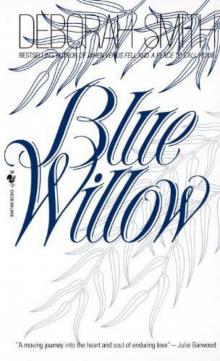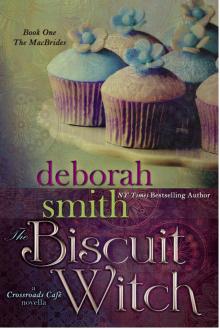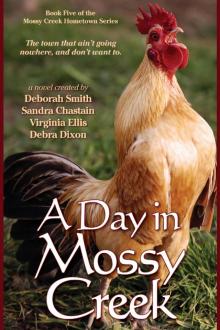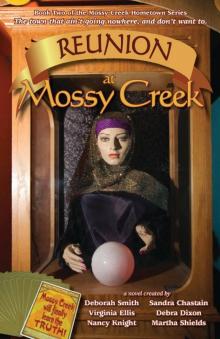- Home
- Deborah Smith
On Bear Mountain Page 9
On Bear Mountain Read online
Page 9
Papa was with a woman.
That last idea sprang into Quentin’s mind unbidden. No matter how much he pushed it away, it galvanized him. He couldn’t just drive back to Brooklyn and tell his mother Papa wasn’t there. He didn’t want to sit in the dark waiting for Papa’s return from a meal, either.
Most of all, he didn’t want to stand there contemplating the thoughts that were going through his mind. Quentin pulled a pair of long, slender tools from his trouser pocket and carefully slid the tips into the door’s keylock. After a minute of expert jiggling and twisting, the bolt clicked back. He eased the heavy metal door open, stepped inside the vast darkness, and shut the door behind him. The steely echo made him uneasy. Papa no longer stored his working materials in that corner.
Quentin moved carefully along the wall until he found a light switch. When he flicked it a hanging work lamp illuminated the plywood cubicle Papa had built as an office and apartment. The twin bed he used was empty, and neatly made. There were no dishes, no sign of a recent meal around the old sink and stove Papa had installed. On the wall behind a scuffed metal desk hung a yellowing photograph of the bear sculpture, with a copy of Betty Tiber Habersham’s check framed next to it.
Quentin glanced up at bare girders and a dingy skylight, as if Papa must be sitting on a cross beam, playing some kind of joke. He cupped his hands around his mouth. “Hey! Papa! You gone, or what?”
No answer. Quentin peered around a corner into the darkness. He took one step back toward the door then stopped because he felt something slide under his tennis shoe. When he scooped it up he saw it was a sealed envelope.
Papa had written in tall block letters on the front: FOR JOEY ARAIZA. JOEY, READ THIS AS SOON AS YOU COME IN. DON’T TAKE ANOTHER STEP. READ THIS FIRST.
Joey Araiza was an art student from one of the local colleges. Papa let him use space in one corner. Joey built boxes out of steel plate, and then he stacked them. Steel boxes were his entire artistic oeuvre. He worshipped Papa.
Okay, so Joey would be here in the morning. Quentin put the envelope on the office desk, then went to a fuse box on a dark wall just outside the cubicle and switched all the breakers. The warehouse’s interior flooded with light from industrial fixtures high overhead. Dozens of his father’s weird metal sculptures looked back at him, gleaming and cold, yet unnerving in their personality. Maybe they did talk, as Papa had claimed when Quentin was little.
He walked warily through a narrow pathway in the maze, squinting into the jungle of twisted metal, feeling foolish. Papa would laugh to see him treading so silently, as if the sculptures could hear.
Papa separated his working and welding area with a makeshift screen built of chain-link fence on a two-by-four frame. The screen was covered with heavy canvas. Quentin went to it and crooked his head around the edge. All he saw was a wall hung with hand tools and welding gear, and in the middle of the floor his father’s welding unit, cutting torches, and heavy work tables. Not a thing out of place. He blew out a breath of relief and wandered forward.
“Okay, so I’m just gonna crash on your bed and wait,” he said aloud. “You’re somewhere, and you’ll be back.” Quentin snorted in disgust, turned to go to the cubicle, then noticed the warehouse’s bathroom just across the work area. The door stood open. He walked into the dark space and flipped the light switch.
His father lay on his back on the cracked tile floor, his face turned toward the door, toward Quentin, his eyes open and blind. He wore one of his tan work shirts, a pair of his jeans with burn marks on them, and leather work boots. His hair was only slightly ruffled, his long legs were splayed out casually, his left arm was draped across his chest. His right arm was flung out, his strong fingers still and relaxed, ending at the butt of a pistol he always kept in the truck.
The floor beneath him was covered in congealed blood. The smell rose up like a slaughterhouse. At the center of his chest was a thick hole rimmed with gore. Tiny pieces of flesh had spattered his shirt and jeans.
Quentin would never be able to fully recall what he did or felt in the minutes after that. Eventually he realized he was sitting outside on the stoop of the open warehouse door, sitting there quietly in the darkness, not making a sound, not crying, not moving.
His hands were covered in rusty flecks of dried blood. Like a crazy man he’d tried to feel a heartbeat in his father’s chest and, simply by touch, to fix whatever had pushed him over the edge of the cliff he had always walked. But he knew the answer.
I killed him, he thought.
CHAPTER 6
Quentin feared his mother would die from grief. He watched her constantly. She did not talk about his father, she did not look at pictures of him, she could not yet bear to discuss his unsold work sitting in the warehouse. She went to work and returned with barely a word passing her lips, her silence so profound that strangers at the library wondered if she were a deaf-mute. Bone thin and sleepless, she often sat up all night before a small television in the living room, her books open but unread on her lap. Her eyes were always hollow, with a thousand-mile stare.
Inside the drawer of her nightstand she kept Papa’s suicide note. He had sealed it in a separate envelope inside the letter he left for Joe, which instructed the hapless art student to call the police, tell them they would find his body in the bathroom, then walk out and not look back.
To Angele he had written:
I’m empty of ideas and hope. There are no more shapes inside me waiting to be formed. I haven’t kept my promises to you, me, or Quentin. Sell everything for scrap and get on with your life. I’m sorry I did this to you and our son. It’s no one’s fault but mine. I love you both too much to keep dragging you down with me.
In the end, he had lost faith in himself long before Mother ever would have, and before Quentin could understand that leaving them was his father’s truest act of creation, a twisted sacrifice built on love. Quentin would always blame himself.
Joe Araiza kept track of inquiries about his sculptures. Several articles were written about Papa in important art journals. Papa’s admirers bought more of his pieces in the six months following his death than ever during his life. Dead artists are more collectible, Quentin thought bitterly, when he allowed himself to think about Papa at all. Papa came to him in nightmares, tired, bloody, his chest torn open, holding out his hands, speaking without words. Quentin always woke up with tears in his eyes, frustrated, trying to hear what Papa wanted to tell him. Or warn him about. The same fate?
No. No. Mother would always be shackled to Papa’s legacy, but Quentin rejected it. Life was about getting the job done, keeping your distance, and looking for the patterns that could kill you. Don’t love what you can’t save, don’t want what you can’t have, don’t need what you might have to die for.
Even Carla couldn’t get past this wall. She’d been there for him every day since the suicide — loyal, caring, and always certain that sex, love, and greedy ambition would all work together in his favor as well as hers. He didn’t think about her when she wasn’t with him. He examined his face in mirrors and wondered how he could be so cold-blooded. It was a sign. Not needing other people would protect him from his father’s curse.
Joe Araiza dutifully brought Mother boxes of Papa’s files. She began to sort through his sketches and notes, jotting references on long legal pads. “I intend to manage and promote my husband’s legacy,” she told Joe, who was in awe of her. “Not only will that legacy survive, it will flourish. I promise you.”
“They’ll say he was a genius,” Joe assured her.
She looked at him without blinking, and nodded. She was able to go on because she could convince herself of absolutes. She wrote a letter to Mountain State College in Tiberville, Georgia.
I am so pleased to think of my husband’s favorite sculpture gracing your campus. I’m sure it has been an object of great admiration and discussion over the past decade. My husband recently passed away, but his work, his goals, and his legacy will live on forever in m
onumental creations such as the bear. In going through his files I discovered that he had given the sculpture a name: Bare Wisdom. The whimsical name reminded me that he was a man of gentle humor as well as brilliant artistic talent. Could you please let me know how Bare Wisdom is doing? I would greatly appreciate any photographs and anecdotes you could send.
Quentin returned from a long walk one night to find her sitting on the apartment stoop with Mrs. Silberstein, who had a consoling arm around her. His mother looked shell-shocked. “What’s wrong?” he asked.
“What those stupid schmucks at that cockamamie college did, that’s what,” Mrs. Silberstein answered hotly. Mother handed him the letter that had come from Mountain State’s administrative office.
Dear Mrs. Riconni,
We’re sorry to inform you that following the recent passing of Mrs. Herbert J. (Betty) Habersham, her commissioned sculpture of a bear was removed from campus and has since been destroyed. No photographs or other information regarding the sculpture will be available now or in the future from Mountain State officials.
“I had dreamed of seeing it again,” Mother said quietly. “I had dreamed of seeing it be celebrated and revered.”
Quentin laid the letter on her lap. “I’d get it back for you, if I could,” he said hoarsely.
All those years, all those hopes, his father’s life, his own honor. He’d give it all back to her, if he could. Everything. His childhood began and ended with the bear.
• • •
He took a Jaguar on a frigid night in early March. He went all the way to Manhattan, slipped the sleek, steel-gray car from a parking garage, and wondered aloud, during the drive back over the bridge that had taken his great-grandfather’s life, if he was asking to get himself caught. When he pulled down into the alley of a chop-shop garage on his home turf he blew the horn, then got out as always and lounged in the shadows nearby, waiting for the owner, a black man named Marshall, to open the garage’s heavy steel doors.
Marshall was slow that night, he thought. Quentin pulled a cheap silver cigarette lighter from the pocket of his black jacket and idly flicked the top. The soft metallic click seemed to echo on the brick walls around him, or to call up an answering sound, not an echo. Quentin frowned and straightened, the hair rising on the back of his neck. He realized too late he’d just heard the sound of a revolver being cocked.
“Police! Don’t move!” someone yelled, and then a second voice repeated that. The beam of a flashlight blinded Quentin and he heard the rush of several officers as they leapt from a doorway farther down the alley. He bolted three long strides toward the street, operating on sheer instinct before he saw another trio running toward him from that direction, too.
By the time he slid to a stop the first group was on him. He was tackled and slammed to the ground, pain shot through his jaw, and he tasted blood in his mouth. Men were sitting on him, standing on him, grinding their heels into the small of his back, jerking his arms half out of their sockets as they wrenched his hands together and cuffed them.
Suddenly they moved back, and he could breathe a little. He raised his head enough to look at the tips of Alfonse Esposito’s polished wingtips. Carla’s father dropped to his heels beside Quentin. Alfonse had a long, serious face, gray sideburns in his black hair, and a nose that had been fractured a half-dozen times. Yet he dressed and spoke with an elegance that was unnerving.
He spoke in a low, utterly dispassionate tone. “I’ve had my suspicions for a long time, but I didn’t want to tell your mother. Yesterday I caught Carla with a fistful of your money. She wouldn’t confess the truth, but I’m not stupid. You’ll get out of this with your nose clean — I’ll do that for your mother’s sake. But it’s going to be on my terms, I’ll make sure of that. Your mother’s a classy lady and she trusted you, and now you’re going to break her heart just like your old man did. And I ought to kill you for getting my daughter involved in this.”
“Go ahead,” Quentin said quietly, filled with stone-cold apathy. He rested his head on the bloody pavement.
• • •
“Did I teach you a code of honor so complex that you could not follow it?” Mother asked in a voice so soft he had to strain to hear it. They faced each other at the kitchen table after he was released on bail. His mouth was swollen, one cheek turning bright purple. He sat with hunched shoulders, his large and capable young hands in front of him on the old Formica tabletop, as if still cuffed together. “I helped you pay the bills,” he rasped. “I saved the rest.”
“Alfonse is sending me the money Carla hid for you in her bank account. Thousands of dollars. I intend to donate it all to charity.”
“That money was my way of taking care of you and me. And Papa, if he hadn’t given up. For the future.”
“You felt your papa always let you down?” Her voice shook with emotion. “You believed he’d never prove himself?”
“Yes.”
“So you became a thief. And a liar. And a cheat. And you allowed Carla Esposito to act as your accomplice. A girl who loves you dearly. All of those choices were an honorable balm for your pride?”
He winced at her description of his judgment. “I take responsibility. I did what I had to do.”
“No, you did what came easiest, and you called it necessity.”
He said nothing. She raised her chin. Her eyes glittered. She looked ragged, her clothes disheveled, her brown hair in wild rivulets and feathered with gray. “I’ve been weak since he died. Allowing myself to mourn endlessly when there was work to be done, and trusting you, depending on you, to take charge of your own life, to be the man I thought he had inspired you to become.”
Quentin’s head, already bowed, sank lower. He didn’t ask for her forgiveness, or shout that his father didn’t deserve any defense. He simply hurt, deep in his soul, for everything. “I’ll make it up to you,” he promised, the words graveled.
“You’ll make it up to him,” she corrected, and left him sitting there, more utterly alone than he had ever been in his life.
• • •
Alfonse was able to get him a deal with a judge who owed Alfonse favors. The judge would keep Quentin’s arrest off the record and have the charges dropped, but only on one condition: Quentin would have to join the army.
The punishment seemed quaint in a post-Vietnam world where military service had become a dubious glory but not a life-threatening one. Yet it meant the loss of his prized scholarship, banishment from home, and the fierce tragedy of his mother’s disappointment. Now he had destroyed another of her dreams.
“My son will go into the army and redeem himself,” she said, when Alfonse gently told her. “I have no doubt.” She hurt too much to let anyone know she was devastated, and she feared she would fly apart if she admitted the destruction of her family, her goals. So she began to school herself to show no outward emotion at all. Quentin could never come to her for a smile or a soft hug, again. He knew he deserved her rejection, and he knew he had to earn her respect, but it nearly killed him.
He opened a box in his closet, took out years of notebooks filled with his writings, carried them downstairs, and burned them in an alley. He saved only one, the first one when he was eight, to remind himself that he’d started out loving and being loved as simply as anyone could imagine.
On the day he left to join the army, Mother stood at the apartment window just as she had done when Papa moved upstate. Dressed in a slender black dress, she raised one hand in formal farewell. From the sidewalk, Quentin gazed up at her in agony and homesickness and self-loathing so thick he went numb. He had visited Alfonse the night before. “I’m asking you to look after my mother,” he said to the stern detective, who quietly smoked a pipe and watched him with shrewd, dark eyes.
“I will. You have my word. In return, I ask that you break off with Carla. No letters, no phone calls. Let her forget you.” Alfonse had sent her to the suburbs of Chicago to stay with an aunt. Quentin heard she was practically locked in the aunt’s
house. He’d received one letter from her, smuggled through a friend. I’ll always love you. I’ll wait for you forever.
He sent her a thousand dollars he had managed to keep, and wrote on a slip of paper, I’m sorry for everything. Don’t wait.
Quentin now winnowed his goals to a brief, blessed few. Survive. Earn the right to live. Never be hurt by a loved one or cause hurt to a loved one again. He had to fit Alfonse’s order into this new structure. As his silence stretched out, Alfonse’s eyes narrowed. “Tell me something. Honestly. Do you love her?”
After a moment, Quentin answered simply, and truthfully. “No.”
“Thank you. Then you’ll be doing her a favor.”
Quentin exhaled slowly. “I won’t contact her. You have my word.”
So he had settled all the scores with his old life, his childhood, as much as he could. He raised a hand in goodbye to Angele Dolinski Riconni, his mother, and to the only home he had ever known. Then he got in a cab and didn’t look back.
When he could no longer see her, Angele pressed her hand to the window, and cried.
• • •
Mama shouldn’t have died; the baby shouldn’t have been hurt. I thought I would become transparent and float away from rage and pain. I convinced myself that Mama would have told me to call the doctor if we’d had the money to pay him — if Daddy hadn’t bought the Iron Bear. Her strict religion, her peculiarities, her own stubborn backwardness evaporated completely from my mind.
Daddy named the baby Arthur, saying it was a heroic name, coming from the old Welsh language, from a time of myth and fantasy, an old Celtic legend. In old legends it paid homage to bears, like my name. Arthur was a hero on the day of his birth, and he was definitely a miracle — because I couldn’t hate him for causing Mama’s death. I think I knew right away that he wasn’t quite as he should be, that he’d been damaged. A doctor told us he might be mentally retarded.

 Legends
Legends Hold on Tight
Hold on Tight Just a Little Bit Guilty
Just a Little Bit Guilty The Beloved Woman
The Beloved Woman Alice At Heart
Alice At Heart Heart of the Dragon
Heart of the Dragon Critters of Mossy Creek
Critters of Mossy Creek Diary of a Radical Mermaid
Diary of a Radical Mermaid Caught by Surprise
Caught by Surprise Stranger in Camelot
Stranger in Camelot At Home in Mossy Creek
At Home in Mossy Creek Charming Grace
Charming Grace Blue Willow
Blue Willow The Pickle Queen: A Crossroads Café Novella
The Pickle Queen: A Crossroads Café Novella On Bear Mountain
On Bear Mountain The Biscuit Witch
The Biscuit Witch Sara's Surprise
Sara's Surprise More Sweet Tea
More Sweet Tea The Apple Pie Knights
The Apple Pie Knights The Silver Fox and the Red-Hot Dove
The Silver Fox and the Red-Hot Dove Sweet Hush
Sweet Hush California Royale
California Royale Hot Touch
Hot Touch Miracle
Miracle The Stone Flower Garden
The Stone Flower Garden A Place to Call Home
A Place to Call Home Silk and Stone
Silk and Stone Honey and Smoke
Honey and Smoke Jed's Sweet Revenge
Jed's Sweet Revenge Silver Fox and Red Hot Dove
Silver Fox and Red Hot Dove The Kitchen Charmer
The Kitchen Charmer A Day in Mossy Creek
A Day in Mossy Creek Never Let Go
Never Let Go Summer in Mossy Creek
Summer in Mossy Creek On Grandma's Porch
On Grandma's Porch The Crossroads Cafe
The Crossroads Cafe Follow the Sun
Follow the Sun The Yarn Spinner
The Yarn Spinner A Gentle Rain
A Gentle Rain Reunion at Mossy Creek
Reunion at Mossy Creek